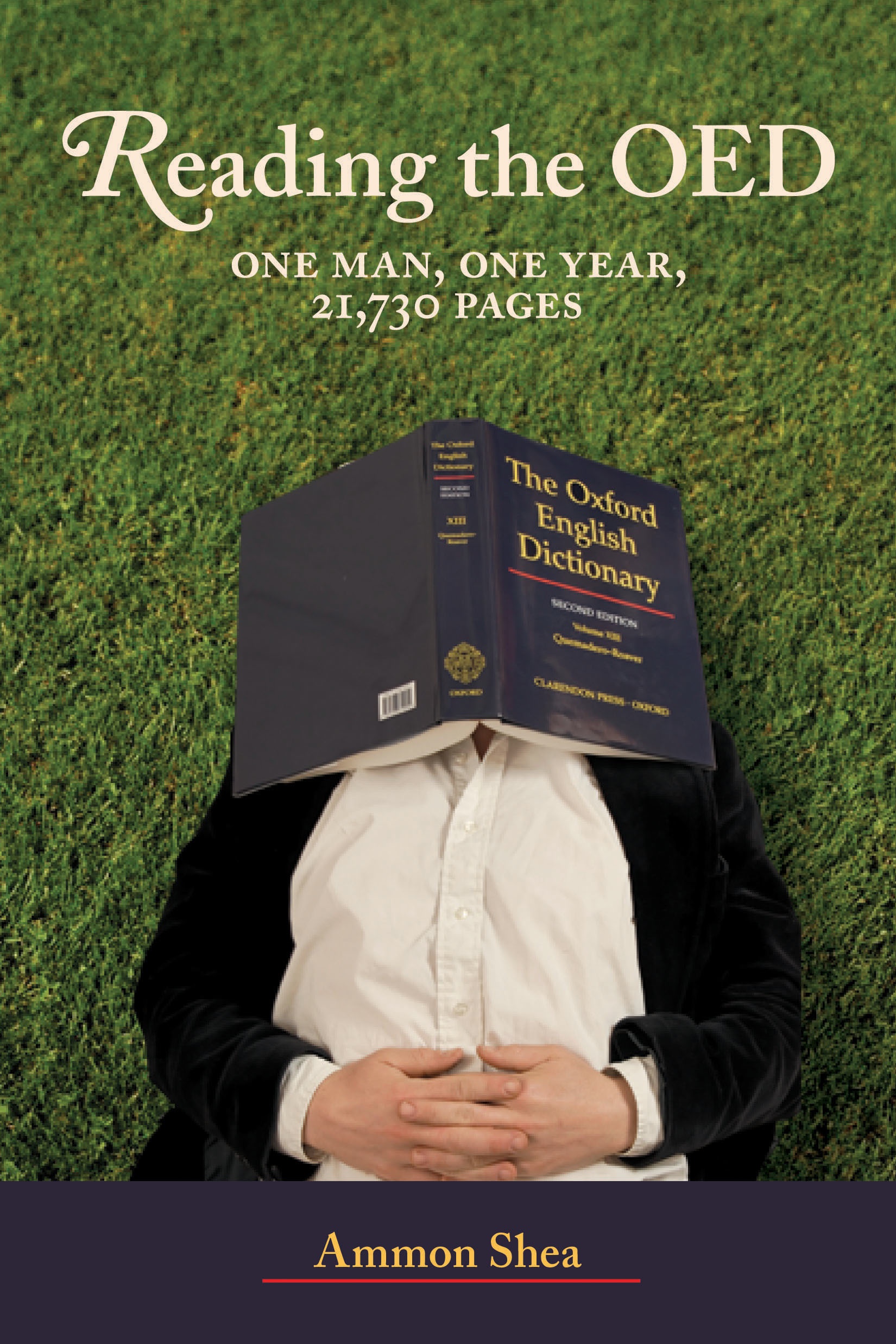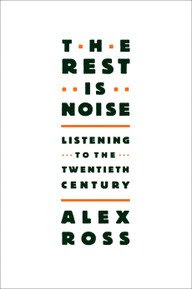Ammon Shea  recently spent a year of his life reading the OED from start to finish. Over the next few months he will be posting weekly blogs about the insights, gems, and thoughts on language that came from this experience. His book, Reading the OED, has been published by Perigee, so go check it out in your local bookstore. In the post below Ammon reflects on an article he saw in The New York Times Book Review.
recently spent a year of his life reading the OED from start to finish. Over the next few months he will be posting weekly blogs about the insights, gems, and thoughts on language that came from this experience. His book, Reading the OED, has been published by Perigee, so go check it out in your local bookstore. In the post below Ammon reflects on an article he saw in The New York Times Book Review.
Last Sunday, in the New York Times, I read a book reviewer taking an author to task for her word use. The reviewer stated that “the last time I checked the American Heritage Dictionary, in spite of how computer trade journalists might choose to use the word, “architect” was not recognized as a verb”.
First, putting aside the obvious slander against computer trade journalists (who themselves would likely not claim to be arbiters of what is recognized in language), are there perhaps some other sources that might recognize “architect” as a verb? Surprisingly enough, there are - both the Oxford English Dictionary and Merriam-Webster’s Third International list “architect” as a verb.
The OED provides citations from as far back as 1813, quoting a letter from Keats, in which he writes “This was architected thus By the great Oceanus.” The OED also specifies that the word, in addition to being used as a verb, is used in a figurative and transferred sense. Perhaps those computer trade journalists were engaging their poetic whimsy and quoting this early nineteenth century versifier.
Webster’s Third does not provide dates for their citation (“the book is not well architected”), but it is from the Times Literary Supplement, and so perhaps the aforementioned computer trade journalists were simply imitating the writing style of some other, more lofty and intellectual publication.
It is always a little bit risky to make a claim that something is not a word, or not used thusly, or has never been a certain part of speech. First, there is simply the possibility that you are wrong. But also, if you spend enough time looking through dictionaries you are just as likely as not to find one or two which contradict whatever position you’ve so boldly staked out. Of course, the flip side of this is that if someone states that you are wrong on the meaning of a word, you can usually find some source that will back up your position.
I’ll bet that the hordes of angry computer trade journalists who read that comment are right now sharpening their pens and rifling through their dictionaries, searching about for the perfect vicious rejoinder to refute this review.
ShareThis

I know some folks are bristling a bit at Margo’s essay in the Times yesterday. Because it suggests a kind of hierarchy of genres, because it reads as a kind of apology, and perhaps as a complaint (by someone who seems to be awfully successful and lucky).
But I want to offer this thought…
When someone has been working toward a goal, any goal, the idea that (at what feels like the very end of the journey) you aren’t going to get the goal, but are instead going to get something else…
That’s kind of hard.
Imagine being a kid, reaching for the brass ring on the carousel, and when you finally get it, it turns out to be a chicken nugget!
You don’t dislike or disrespect chicken nuggets. In fact you may LOVE chicken nuggets. But you’ve been going around and around and around on a big painted frog for a very specific reason, to get a RING. And now, here you are with a nugget.
I can relate to the essay. I can REALLY relate to the essay, and have done a bit of apologizing/defending/complaining myself about such things.
I spent YEARS becoming a poet. It was and is a huge part of my identity. I dreamed of teaching gigs and colonies and silly snooty book parties. From the age of 15 I dreamed of such things.
So no matter how thrilled and excited and happy I am to be writing mg novels and picture books, and no matter how much I believe in these books and have made a choice (the right choice!), I did feel strange the day I realized I couldn’t apply to colonies to work on such projects, because such places only fund ADULT LITERARY writing. And my books, it would seem, aren’t literature now that they come from a children’s imprint. And my books won’t help land me the teaching job I still dream of, because I love teaching…
Honestly, it does still feel weird when I tell people I have this novel coming out and they say, “But you’re still writing poetry, right? Right?”
(I am, but I don’t feel I should need to legitimize myself that way)
For me, when I had my kidlit conversion, the issue was different than for Margo, because for me it was an internal process, of realizing that some of my “prose poems” were in fact picture books. Of realizing that these ideas and words and books I wanted to write would best be WRITTEN (not just marketed) for kids. I had to work through my issues with the academy and the hierarchy first, slowly, on the inside. I had time to prepare myself, get ready to say “THPBBBT!” to poety friends who might turn up their noses. Becuase I really WANTED to write for kids, and jsut had to get used to the idea.
But for Margo it happened very suddenly–how much stranger to write a book with one audience in mind, and discover overnight you’ve got another.
And then to realize that all the things you’ve worked toward are different things now, suddenly.
I can’t count the artists I know who’ve ended up in more lucrative graphic design jobs, apologizing for themselves. The law school students who take another kind of job and look sheepish about it when they ahve to tell people what they do. Why is that okay, but this isn’t?
It doesn’t have to be a value judgement of YA by the author. Margo obviously likes YA and reads YA, and now she’s simply indicating something about our literary culture, and descibing an experience she had, which seems to me pretty reasonable.
That she expected/ worked for/ dreamed of one thing, and got another.
Like expecting a girl and getting a boy maybe. You love your kids. You can’t imagine anything other than what you got. But when you get home from the hospital, you look around the frilly pink room, and you have to adjust. And that takes a little minute.
I really hope this is all changing. I really hope that soon there will be more respect paid to kidlit and YA. Because it’s an AMAZING literature. Because I have come to believe that more interesting, creative, vital, and artistic work is being written for kids than for grownups right now. Because kids are reading more as adults are reading less. Because these truly are the books I love right now.
But I won’t lie and pretend that when a smartypants short-fiction friend clutching some long boring book of experimental writing , (fresh from a stint at Yaddo or Macdowell or VSC or someplace else I’m not allowed to go) asks what I’m working on… I get a little weird. I rant a bit. I give them a speech, a little like this one.
A speech designed to educate but also– to defend. Which implies at least a little bit of insecurity, and I’d be lying if I pretended otherwise. In that moment I do feel insecure.
But that’s a really small part of what I’m feeling in that moment. Because most of all I’m thinking, “THANK GOD I DON’T HAVE TO READ THAT LONG BORING GROWNUP BOOK YOU’RE HOLDING!”
HA!

"It is a matter not of traveling from one place to another, but of uncovering
the destination inside the point of departure." Steve Reich.
THE REST IS NOISE, LISTENING TO THE TWENTIETH CENTURY, by Alex Ross (Farrar, Straus and Giroux, 2007) is a history of twentieth century "classical" music. And it rocks with the beat of a chaotic century. Dense with biography and cultural context, it leafs through the pages of time with a close look that is light and clear.
From Strauss and Mahler, who open the century, to Reich and Adams who close it, the sounds of street and country, oppression and rebellion move together and separately (tonally and atonally?) in a hypnotic dance. Alex Ross is brilliant, not just in explaining a complex subject, but in evoking the very essence of music with his language.
This is a great read. It has history, biography, music, culture, and clash in it.
Although there is a clear narrative element, THE REST IS NOISE, achieves something much larger, more panoramic than a trip through the decades from start to finish. Brian Eno's words on minimalism could apply equally to Alex Ross' history of music: "a drift away from narrative and towards landscape, from performed event to sonic space."
Curiously enough, the writer in me wants to rush out, and --not listen to all of the music described elegantly, not purchase the suggested listening recordings, but rather-- find and re-read Thomas Mann's
Doctor Faustus. And then I want to listen to the sounds of the 20th century!
recently spent a year of his life reading the OED from start to finish. Over the next few months he will be posting weekly blogs about the insights, gems, and thoughts on language that came from this experience. His book, Reading the OED, has been published by Perigee, so go check it out in your local bookstore. In the post below Ammon reflects on an article he saw in The New York Times Book Review.





“The reviewer stated that “the last time I checked the American Heritage Dictionary, in spite of how computer trade journalists might choose to use the word, “architect” was not recognized as a verb”.”
Any statement starting “The last time I checked…” can safely be ignored. It’s just someone trying to be all snotty and superior.
Beyond that, unless you’re a rock-ribbed and diehard prescriptivist, listening and reading might well be a better way to assess changing usage than simply picking up one dictionary.
Any statement starting “The last time I checked…” can safely be ignored. It’s just someone trying to be all snotty and superior.
Agreed. Similarly, any sentence that begins with the phrase “See, …” can be safely ignored as patronizing dogma.
- Karl Jones